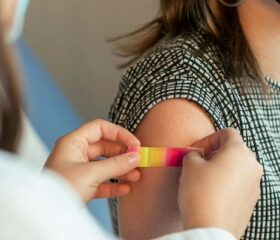Tdap Shot During Pregnancy: Safety and Why You Need It
Your baby will be very vulnerable during the first few months of his life. One step you can take to keep him safe is to stay up-to-date with your vaccines, including the Tdap.

Never underestimate the power of preventive measures during pregnancy. With so many invisible nasties waiting for your baby in this germ-filled world, a tiny vaccine jab will go a long way toward building his initial resistance.
The Tdap is one of the most important vaccines you can get before your baby’s born, giving his little immune system the boost it needs in the early days.
Read on to learn all about the Tdap vaccine and the role it plays in guarding your baby in the womb and beyond.
What is the Tdap vaccine?
The Tdap is a vaccine that protects against three potentially life-threatening diseases:
- Tetanus: With tetanus, often also known as “lockjaw,” bacteria enter the body through a cut or wound, ultimately causing painful muscle tightening. The jaw and neck become focal points, and it can become difficult to breathe or swallow. Tetanus is fatal for 1 in 4 people without treatment, but that number drops to fewer than 15% with proper care. 1
- Diphtheria: This infection targets the throat and nose and causes a thick coating to form. The result is breathing difficulty and, in severe cases, heart failure, paralysis, and even death. About 1 out of 5 unvaccinated children under 5 years old who get diphtheria will die from the infection. 2
- Pertussis: This respiratory infection is also called “whooping cough.” It’s highly contagious and causes severe coughing fits that make breathing difficult. Other symptoms include vomiting, seizures, and brain damage and death in severe cases. Globally, over 160,000 children under 5 years die annually from the infection. 3
What’s the difference between Tdap and DTaP?
The DTaP is an early childhood vaccine, and the Tdap is a vaccine for preteens, teens, and adults. Both the DTaP and Tdap are combination shots that target tetanus, diphtheria, and acellular pertussis.
Following a standard immunization schedule, your baby will receive the DTaP when he’s 2 months, 4 months, and 6 months old, with boosters at 15–18 months and 4–6 years. Doctors recommend getting the Tdap at 11–12 years and boosters every decade after that. 4
If needed, set reminders for these appointments and keep track of the shots in your phone or a baby tracker app. Some of the best baby trackers also let you track your baby’s medications, symptoms, and temperature in between vaccinations to help you better understand your baby’s overall health.
Why is getting a Tdap vaccine important during pregnancy?
Babies are particularly vulnerable to whooping cough and its potentially life-threatening complications up until they’re 3 months old. 5
Since your baby won’t receive the first dose of the DTaP vaccine until he’s 2 months old, he won’t have the necessary antibodies that’ll protect him from whooping cough.
This is where the Tdap vaccine during pregnancy comes into play. It protects your baby through: 6
- Antibody transfer: The Tdap shot encourages your body to produce antibodies against pertussis, tetanus, and diphtheria, You’ll then transfer these antibodies to your baby via the placenta, giving him passive immunity until he’s old enough for the DTaP. You can also pass these antibodies to him through your breast milk.
- Reduced risk of infection: Your baby is most likely to catch whooping cough from close contact, as it spreads through tiny drops of fluid from an infected person’s mouth or nose. 7 The Tdap lowers your risk of contracting the disease yourself and transmitting it to him.
You may sometimes hear doctors use the term “cocooning.” The idea is that vaccinating yourself and other close family members (e.g., spouses, grandparents, and caregivers) creates a protective “cocoon” around your little one to further minimize the risk of disease exposure.
How else can you protect your baby from whooping cough?
Outside of getting the shot yourself and getting your baby his DTaP at 2 months, the rest of your family (or anyone who’ll have contact with your baby, for that matter) needs to stay up-to-date with their vaccines. If any adults in your family or caregivers haven’t gotten their Tdap shot yet, they should get it at least 2 weeks before having contact with your baby. 8
Vaccination can sometimes be a delicate subject to broach, but remember that your baby’s safety is your number one priority. Sometimes, that means having difficult conversations.
When should you get the Tdap jab?
The CDC recommends getting the Tdap vaccine between week 27 and week 36 of your pregnancy, regardless of your vaccination history. That means you should still get the Tdap shot even if you had it in a previous pregnancy.
If you miss the shot recommendation window, you’ll still have the option before delivery or immediately postpartum. 9
From there, you can expect your body to take a couple of weeks to produce the antibodies. Keep in mind that protection wanes over time, particularly after 4 years. 10
Is getting the Tdap vaccine safe during pregnancy?
Many parents get anxious about vaccines, especially with the plethora of misinformation online regarding their safety. However, the Tdap vaccine is totally safe for both you and your baby. 11
The Tdap vaccine contains inactivated (killed) bacteria, which means you can’t contract tetanus, diphtheria, or pertussis from it. Studies show no evidence that the Tdap vaccine increases the risk of pregnancy complications like preterm labor or adverse birth outcomes.
The Tdap received its license for use in the US in 2005 for adolescents and adults, and the CDC began recommending the Tdap for pregnant women in 2012. 12 13
Potential side effects for you
Like most vaccines, the Tdap comes with side effects, but they’re generally mild and temporary. The most common are body aches, fatigue, headache, mild fever, nausea, and chills. You can also expect soreness, redness, or swelling at the injection site. 14
If you get the shot while pregnant, you can keep your eye on your symptoms in your journal or a pregnancy tracker app in case you want to bring up anything with your doctor.
Severe reactions to vaccines are rare
Fortunately, serious reactions to vaccines are extremely rare. Resources like the Vaccine Adverse Event Reporting System (VAERS) and manufacturer pregnancy registries are useful for monitoring vaccine safety and reviewing data on adverse events.
Final thoughts
While many moms-to-be are understandably hesitant to “put anything else” into their bodies, the Tdap vaccine is not only safe during pregnancy, it also offers invaluable protection to your baby.
If you’re still unsure, your doctor or midwife will always be happy to talk through your concerns with you. With their support, you’ll be able to give your baby all the protection he needs to enter the big, wide world.
Article Sources
- Penn Medicine. "Tetanus" Retrieved August 15, 2025.
- College of Physicians of Philadelphia. "Diphtheria" Retrieved August 15, 2025.
- National Foundation for Infectious Diseases. "Whooping Cough (Pertussis)" Retrieved August 15, 2025.
- Nemours KidsHealth. "Diphtheria" Retrieved August 15, 2025.
- American College of Obstetricians and Gynecologists. "Frequently Asked Questions for Pregnant Women Concerning Tdap Vaccination" Retrieved August 15, 2025.
- American College of Obstetricians and Gynecologists. "The Tdap Vaccine and Pregnancy" Retrieved August 15, 2025.
- Nemours KidsHealth. "Whooping Cough (Pertussis)" Retrieved August 15, 2025.
- American College of Obstetricians and Gynecologists. "Update on Immunization and Pregnancy: Tetanus, Diphtheria, and Pertussis Vaccination" Retrieved August 15, 2025.
- Immunize.org. "DTaP, Tdap, and Td Catch-up Vaccination Recommendations by Prior Vaccine History and Age" Retrieved August 15, 2025.
- Morbidity and Mortality Weekly Report. "Use of Tetanus Toxoid, Reduced Diphtheria Toxoid, and Acellular Pertussis Vaccines: Updated Recommendations of the Advisory Committee on Immunization Practices — United States, 2019" Retrieved August 15, 2025.
- Centers for Disease Control and Prevention. "You can start protecting your baby from whooping cough before birth" Retrieved August 15, 2025.
- Centers for Disease Control and Prevention. "Tdap Vaccination for Pregnant Women" Retrieved August 15, 2025.
- Children's Hospital of Philadelphia. "Vaccine History: Developments by Year" Retrieved August 15, 2025.
- Centers for Disease Control and Prevention. "Diphtheria, Tetanus, and Pertussis Vaccine Safety" Retrieved August 15, 2025.






